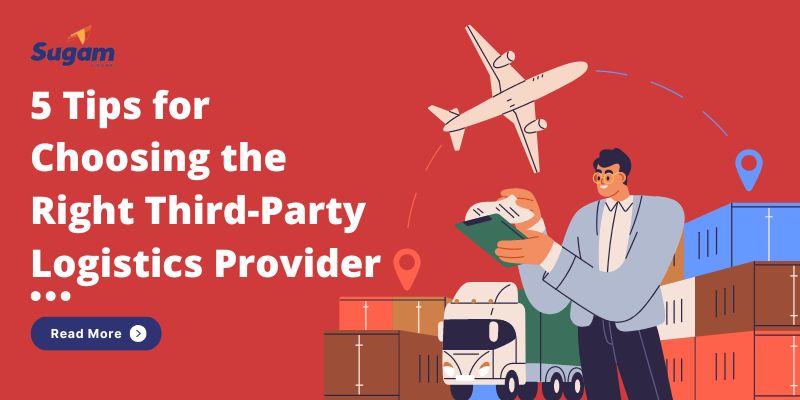5 Tips for Choosing the Right Third-Party Logistics Provider
As businesses grow and expand, managing logistics and supply chain operations can become increasingly complex and time-consuming. Working with a third-party logistics provider (3PL) can help businesses streamline their operations, reduce costs, and gain access to specialized expertise and resources. However, with so many 3PL providers to choose from, it can be challenging to find the right partner for your business. Choosing the wrong 3PL supply chain can lead to inefficiencies, increased costs, and missed opportunities. Let’s explore five tips to help you choose the right third-party logistics provider for your business.
5 Key Considerations When Choosing a Third-Party Logistics Provider
Let’s dive deeper into each of the five tips for choosing the right third-party logistics provider. We’ll provide detailed explanations and actionable advice to help you make an informed decision and find a 3PL partner that can help your business achieve its logistics goals.
-
Determine Your Business Needs:
Before you start researching 3PL providers, it’s important to assess your logistics needs and identify areas where a 3PL can provide value. Consider factors such as your current logistics capabilities, your goals for growth and expansion, and any challenges or pain points you’re currently experiencing. Once you’ve identified your needs, you can begin searching for 3PL providers that can meet those needs.
Also Read :- Why Your Business Needs 3Pl Service
-
Evaluate 3PL Providers:
Researching potential 3PL providers is a critical step in finding the right partner for your business. Start by evaluating their capabilities, expertise, and reputation. Look for providers with experience working with businesses similar to yours, and check references and reviews to ensure they have a track record of success. You should also evaluate their technological capabilities, including their ability to integrate with your existing systems and provide real-time tracking and visibility.
-
Consider Cost and Value:
While cost is an important consideration when choosing a 3PL, it’s not the only factor to consider. Look beyond the upfront costs to evaluate the overall value provided by the 3PL’s services. Consider factors such as their ability to streamline your operations, reduce costs in the long term, and provide specialized expertise and resources that you may not have in-house.
-
Review Contract and Service Agreement:
Before signing a contract or service agreement with a 3PL, it’s important to review the terms carefully to ensure they align with your business needs and expectations. Pay close attention to factors such as service level agreements, liability and insurance, and termination clauses. It’s also important to ensure the agreement includes clear expectations for communication and collaboration between your business and the 3PL provider.
-
Communication and Collaboration:
Effective communication and collaboration are essential for a successful partnership with a 3PL provider. Establish clear expectations and guidelines for communication from the outset, and ensure there are regular check-ins and reporting to track progress and address any issues that arise. Building a strong relationship with your 3PL provider can help ensure that you achieve your logistics goals and drive business growth.
Conclusion:
Choosing the right third-party logistics provider is a critical decision that can have a significant impact on your business operations and bottom line. By following these five tips, you can make an informed decision and select a 3PL partner that can help your business grow and thrive, and this is where Sugam Group comes into light. Sugam Group is an industry-leading 3PL provider that helps businesses manage their supply chain operations, from warehousing and transportation to distribution and fulfilment. Remember, the right 3PL partner is not just a vendor, but an extension of your team, and choosing the right one can help you achieve your logistics goals and drive business success.
FAQs:
-
How do I choose a third-party logistics provider?
Choosing a third-party logistics provider involves evaluating your business needs, researching potential providers, and assessing the providers based on their experience, capabilities, and services offered. It’s important to choose a 3PL that aligns with your business goals and can help you achieve them.
-
What characteristics make a great 3rd party logistics provider?
A great third-party logistics provider should have a strong reputation, extensive experience in the industry, a wide range of services, advanced technology, and a focus on customer service. They should also have a flexible and scalable approach to logistics management, tailored to your specific business needs.
-
What is the criteria for selecting 3PL?
The criteria for selecting a third-party logistics provider typically includes their experience, services offered, pricing and value, technology capabilities, and their ability to communicate and collaborate effectively. Additionally, you should evaluate their reputation, certifications, and compliance with industry standards.
-
What are the 5 categories of 3PL providers?
The five categories of 3PL providers are:
- Transportation-Based 3PLs
- Warehouse and Distribution-Based 3PLs
- Forwarder-Based 3PLs
- Financial-Based 3PLs
- Information-Based 3PLs
-
What characteristics make a great 3rd party logistics provider?
A great third-party logistics provider should have a strong reputation, extensive experience in the industry, a wide range of services, advanced technology, and a focus on customer service. They should also have a flexible and scalable approach to logistics management, tailored to your specific business needs. Additionally, they should be reliable, communicative, and collaborative, and able to provide a high level of transparency and visibility into your supply chain operations.




No Comments